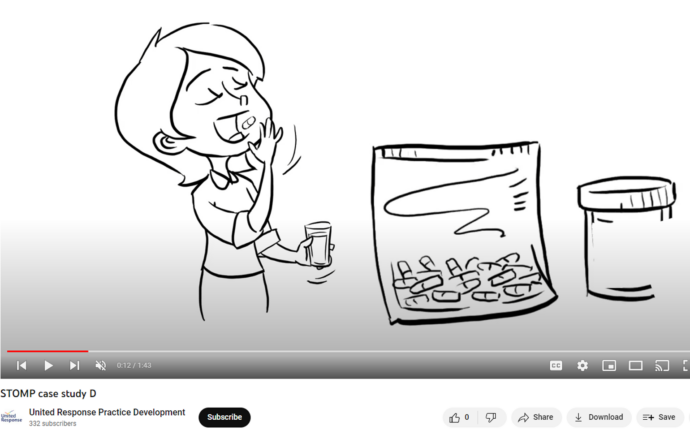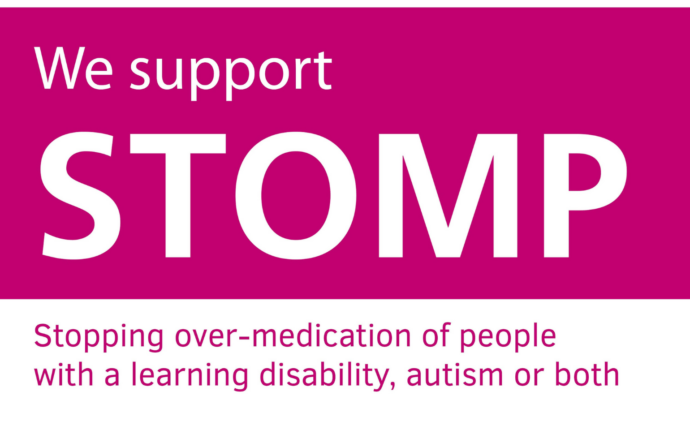STOMP in United Response

Psychotropic medicines affect how the brain works and include medicines for psychosis, depressions, anxiety, sleep problems and epilepsy. These medicines are right for some people, but used wrongly and/or over a prolonged period they can:
- affect quality of life & health (with side effects like putting on weight, feeling tired or ‘drugged up’, serious problems with physical health & even premature death)
- act as a chemical restraint that stops people having full lives
- make thing worse instead of better
- be a quick fix instead of a solution
- be a quick fix that becomes a way of life
The 2020 Learning Disabilities Mortality Review report identified that, contrary to advice from NICE, almost a quarter of all people who have died were on an antipsychotic medication, of which 8% were taking two or more of these drugs.
People with a learning disability, autism or both are more likely to be given these medicines than other people:
… we estimate that between 30,000 and 35,000 adults with a learning disability in England are taking one or both of these types of drugs in the absence of the conditions for which they are indicated.
Public Health England (2015)
What is STOMP?
In response to this report, NHS England launched STOMP in 2016.
STOMP stands for stopping the over-medication of people with a learning disability, autism or both with psychotropic medicines. It is a national project involving many different organisations which are helping to stop the overuse of these medication. STAMP is a similar project for young people.
The STOMP project had an initial brief to run for 3 years to raise awareness of the issue and to engage relevant organisations to implement plans to challenge this practice.
The primary aim was to challenge inappropriate- or over-prescription of medication through the use of focused and holistic medication reviews linked to improvements in quality of life. In 2019, the project aims were incorporated into the NHS 10 Year plan.
The STOMP awareness programme culminated in a series of pledges from health and social care providers, Royal Colleges and professional bodies.
Why STOMP matters: new video
This new video produced by the United Response Quality & Practice Team and students at URTEC, explains what can happen when people with learning disabilities are over medicated and how, when you ask the right questions, you might even find that medication isn’t the answer at all.

STOMP and United Response
United Response joined STOMP in May 2017 and we pledged to do our best to identify all practical steps we could take to support people to reduce the amount of inappropriate psychotropic medication they take.
Initially our approach was to:
- carry out an audit of the use of psychotropic medication and raise awareness of the issue
- promote the STOMP resources, including
- ‘Preparing to visit a doctor to talk about psychotropic medication’
- ‘The toolkit for GP prescribers’
- ‘Easy read advice for the people we support, families and carers’
- support teams to review the current use of medication and work with professionals to review and reduce the use of medication prescribed to manage behaviour described as challenging.
STOMP and Positive Behaviour Support
The introduction of a new Positive Behaviour Support Policy in 2019 provided another opportunity to affect change in this area.
The new policy required the introduction of any new restrictive interventions (including chemical restraint) to be authorised by the Area Manager and reviewed on an annual basis (or sooner, where circumstances change for the individual).
It also established criteria to ensure the following are completed in order to decide if the intervention is ethical and justifiable:
- A positive behaviour support plan (including a restraint reduction plan)
- A risk assessment
- MCA Specific Decision-Making Record or Best Interest Assessment
- Information regarding any deprivation of liberty or court of protection judgement
- Medical reports/reviews regarding the use of chemical restraints
- Authorisation from medical professionals
Applying these criteria ensures any use of chemical restraint is carefully thought through and fits well with the STOMP mantra:
The right medication at the right time, for the right reason, for as short a time as possible
Read: discover how ‘Richard’ has been supported to reduce his medication
View D’s STOMP story: new video
This new video produced by the United Response Quality & Practice Team is about how consistent and positive behavioural support helped D reduce her medication.

Implementing STOMP
In 2021, with the appointment of the Head of Healthcare and the development of our healthcare strategy, we were able to include STOMP as one of our priorities.
As part of our ‘learning lunch’ series we designed and delivered a webinar focussed on the STOMP campaign, utilising the national and local data and including some case studies.
By working closely with our operations teams, our Head of Healthcare has also been able to identify where chemical restraint is being used and has supported teams to make appropriate referrals. We have also linked STOMP to our medication policy to enable an additional prompt reminder.
Over the last 5 years United Response has also developed a strong network of local Positive Behaviour Support Coaches and introduced three Positive Behaviour Support Leads. They work closely with services which support people whose behaviour is described as challenging to understand and implement Positive Behaviour Support and reduce the use of restrictive practices and interventions.
One Positive Behaviour Support Coach immediately queried why a chemical restraint had been prescribed which resulted in the GP removing this and with diligent Positive Behaviour Support, no restrictive interventions have been needed to support the person.
During the pandemic Positive Behaviour Support Leads focused on the use of physical interventions, identifying and reviewing their use and supporting teams to develop proactive approaches to reduce or eliminate behaviour described as challenging and/or to identify alternative non-physical reactive strategies when behaviour occurs.
This focused attention resulted in a significant reduction in planned physical interventions in a number of services and we are now using the learning from this work to focus on the use of chemical restraint.
Carrying out a STOMP audit

There is already a database which records chemical restrictive interventions in use across United Response. However, there are concerns that many managers don’t realise that the people they support are prescribed chemical restraints.
For this reason, in November 2022, managers were asked to read through the medical records of everyone they support currently prescribed one or more of the 5 most common chemical restraint medications and record the dose, whether it was a PRN medication or a daily medication, and why the medication was prescribed, onto a STOMP audit form.
Top 5 medications prescribed to manage behaviour that challenges:
1. Diazepam
2. Lorazepam
3. Risperidone
4. Olanzapine
5. Quetiapine
This approach was used because our experience suggests it’s difficult for teams to identify only psychotropic medications used to reduce behaviours that challenge: words used by medical professionals as a reason for prescribing the medication, such as anxiety, can be confusing.
Teams may see this medication as a response to a mental health diagnosis rather than an attempt to manage the behaviour (caused by anxiety).
For this reason, teams were asked to record if the person was prescribed these medications for any reason and why. This approach enables us to carry out more investigation and analysis to further identify whether the prescription was in response to behaviour that challenges or not.
Now the Positive Behaviour Support Leads (and PBS Coaches with an interest in this area) are working with a selection of individuals from the resulting audit list. They work with the person and their support team to develop and implement a reduction plan.
For the reduction plan to be successful the Positive Behaviour Support Lead needs to ensure the person has a functional assessment and an updated Positive Behaviour Support Plan in place.
The PBS plan has to include changes in the everyday support the person receives to help them learn alternative ways to cope and communicate when they are finding things difficult.
The PBS Leads will also support PBS coaches to work with people who are supported by United Response and their teams to ensure clear restraint reduction plans for the use of psychotropic medications, which have been prescribed without a diagnosed mental health problem, are included in the individual’s Positive Behaviour Support Plan and that these are implemented and reviewed routinely.
STOMP Resources
Alongside this work we are re-launching STOMP across the organisation using the following resources:
- The STOMP video: this new video produced by the United Response Quality & Practice Team and students at URTEC, explains what can happen when people with learning disabilities are over medicated and how, when you ask the right questions, you might even find that medication isn’t the answer at all.
- Internal report and call to action using the learning from the audit
- Introduction of new on-line resources on the United Response Intranet
- Introduction of an annual audit from November 2023 along with an annual review and report on the reduction of chemical restraint.

Find out more about STOMP
NHS England: Stopping over medication of people with a learning disability, autism or both
You can find out more on the NHS STOMP webpage, along with links to other useful resources and the many organisations that support STOMP.
Free STOMP Training
A collection of new sessions on STOMP has been added to the MindEd mental health eLearning programme.
Developed by Health Education England eLearning for Healthcare, in collaboration and partnership with NHS England’s STOMP team, it features 5 knowledge-based eLearning sessions and 1 skills building case study covering the following topics:
- Inappropriate Prescribing (for a universal audience)
- Psychotropic Medication 1 (for a universal and non-specialist professional audience)
- Psychotropic Medication 2 (this session is specifically aimed at a specialist audience, primarily psychiatrists, psychologists, GPs, pharmacists and mental health and learning disability nurses)
- How to challenge inappropriate medication 1 (for a universal audience)
- How to challenge inappropriate medication 2 (case study) (for a universal audience)
For more information and to access the sessions, please visit the MindEd programme page.
Multicultural STOMP (MC-STOMP)
Dr Hassan Mahmood, Consultant Psychiatrist (Birmingham Community Health Care), has developed Multicultural STOMP for people from an ethnic minority background, which is the first initiative of its kind in the United Kingdom, to ensure that STOMP is available to everybody.
VODG: Preparing to visit a doctor to talk about psychotropic medication
This webpage is for healthcare professionals, families or carers supporting people aged 19 or over who have a Learning Disability and conditions such as Autism, to access information about STOMP in various languages.
NICE guidance on challenging behaviour and learning disabilities
This resource is a guide for a support worker who is accompanying a person with a learning disability, autism or both to a GP consultation appointment to talk about psychotropic medication. It has been produced as part of the STOMP healthcare campaign to stop over medication.
References
Public Health England (2015): Prescribing of psychotropic drugs to people with learning disabilities and/or autism by general practitioners in England